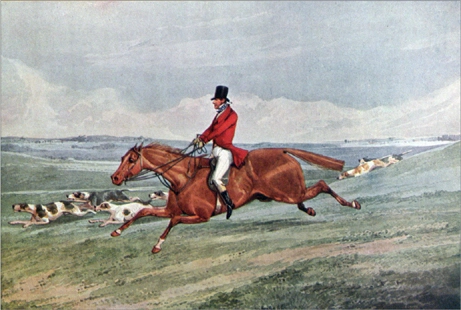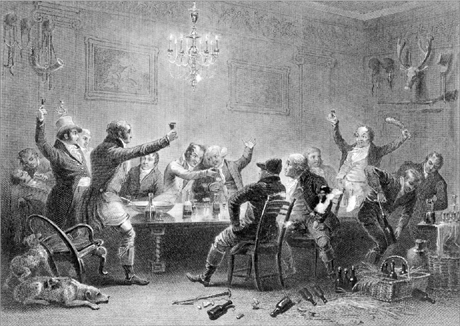That she might not appear, however, to observe or expect him, she kept her eyes intently fixed on her fan;25 and a self-condemnation for her folly, in supposing that among such a crowd they should even meet with the Tilneys in any reasonable time, had just passed through her mind, when she suddenly found herself addressed and again solicited to dance, by Mr. Tilney himself. With what sparkling eyes and ready motion she granted his request, and with how pleasing a flutter of heart she went with him to the set, may be easily imagined. To escape, and, as she believed, so narrowly escape John Thorpe, and to be asked, so immediately on his joining her, asked by Mr. Tilney, as if he had sought her on purpose!—it did not appear to her that life could supply any greater felicity.
Scarcely had they worked themselves into the quiet possession of a place,26 however, when her attention was claimed by John Thorpe, who stood behind her. “Hey-day, Miss Morland!” said he, “what is the meaning of this?—I thought you and I were to dance together.”
“I wonder you should think so, for you never asked me.” “That is a good one, by Jove!—I asked you as soon as I came into the room, and I was just going to ask you again, but when I turned round, you were gone!—this is a cursed shabby trick! I only came for the sake of dancing with you, and I firmly believe you were engaged to me ever since Monday. Yes; I remember, I asked you while you were waiting in the lobby for your cloak. And here have I been telling all my acquaintance that I was going to dance with the prettiest girl in the room; and when they see you standing up with somebody else, they will quiz me famously.”
“Oh, no; they will never think of me, after such a description as that.”
“By heavens, if they do not, I will kick them out of the room for blockheads. What chap have you there?” Catherine satisfied his curiosity. “Tilney,” he repeated, “Hum—I do not know him. A good figure of a man; well put together.—Does he want a horse?—Here is a friend of mine, Sam Fletcher, has got one to sell that would suit any body. A famous clever animal for the road27—only forty guineas. I had fifty minds to buy it myself, for it is one of my maxims always to buy a good horse when I meet with one; but it would not answer my purpose, it would not do for the field. I would give any money for a real good hunter.28 I have three now, the best that ever were back’d.29 I would not take eight hundred guineas for them.30 Fletcher and I mean to get a house in Leicestershire,31 against the next season.32 It is so d—— uncomfortable, living at an inn.”

Fox hunting.
[From Ralph Nevill, Old Sporting Prints (London, 1908)]
[List of Illustrations]
This was the last sentence by which he could weary Catherine’s attention, for he was just then borne off by the resistless pressure of a long string of passing ladies.33 Her partner now drew near, and said, “That gentleman would have put me out of patience,34 had he staid with you half a minute longer. He has no business to withdraw the attention of my partner from me. We have entered into a contract of mutual agreeableness for the space of an evening,35 and all our agreeableness belongs solely to each other for that time. Nobody can fasten themselves on the notice of one, without injuring the rights of the other. I consider a country-dance as an emblem of marriage. Fidelity and complaisance36 are the principal duties of both; and those men who do not chuse to dance or marry themselves, have no business with the partners or wives of their neighbours.”
“But they are such very different things!—”
“—That you think they cannot be compared together.”

A party after the hunt. Such parties, a standard feature of fox hunting, are probably one reason for John Thorpe’s interest in joining other hunters in a prime venue for the sport.
[From William Henry Scott, British Field Sports (London, 1818), frontispiece]
[List of Illustrations]
“To be sure not. People that marry can never part, but must go and keep house together.37 People that dance, only stand opposite each other in a long room for half an hour.”38
“And such is your definition of matrimony and dancing. Taken in that light certainly, their resemblance is not striking; but I think I could place them in such a view.—You will allow, that in both, man has the advantage of choice, woman only the power of refusal; that in both, it is an engagement between man and woman, formed for the advantage of each; and that when once entered into, they belong exclusively to each other till the moment of its dissolution; that it is their duty, each to endeavour to give the other no cause for wishing that he or she had bestowed themselves elsewhere, and their best interest to keep their own imaginations from wandering towards the perfections of their neighbours, or fancying that they should have been better off with any one else. You will allow all this?”
“Yes, to be sure, as you state it, all this sounds very well; but still they are so very different.—I cannot look upon them at all in the same light, nor think the same duties belong to them.”
“In one respect, there certainly is a difference. In marriage, the man is supposed to provide for the support of the woman; the woman to make the home agreeable to the man; he is to purvey, and she is to smile. But in dancing, their duties are exactly changed; the agreeableness, the compliance are expected from him, while she furnishes the fan and the lavender water.39 That, I suppose, was the difference of duties which struck you, as rendering the conditions incapable of comparison.”
“No, indeed, I never thought of that.”
“Then I am quite at a loss. One thing, however, I must observe. This disposition on your side is rather alarming. You totally disallow any similarity in the obligations; and may I not thence infer, that your notions of the duties of the dancing state are not so strict as your partner might wish? Have I not reason to fear, that if the gentleman who spoke to you just now were to return, or if any other gentleman were to address you, there would be nothing to restrain you from conversing with him as long as you chose?”
“Mr. Thorpe is such a very particular friend of my brother’s, that if he talks to me, I must talk to him again; but there are hardly three young men in the room besides him, that I have any acquaintance with.”
“And is that to be my only security? alas, alas!”
“Nay, I am sure you cannot have a better; for if I do not know any body, it is impossible for me to talk to them; and, besides, I do not want to talk to any body.”
“Now you have given me a security worth having; and I shall proceed with courage. Do you find Bath as agreeable as when I had the honour of making the inquiry before?”
“Yes, quite—more so, indeed.”
“More so!—Take care, or you will forget to be tired of it at the proper time.—You ought to be tired at the end of six weeks.”
“I do not think I should be tired, if I were to stay here six months.”
“Bath, compared with London, has little variety, and so every body finds out every year.
1 comment